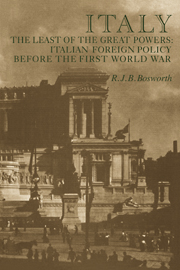Book contents
- Frontmatter
- Contents
- Dedication
- Preface
- List of maps
- 1 Society and politics in Liberal Italy
- 2 New political pressure groups and foreign policy
- 3 The making of a Foreign Minister: Antonino Di San Giuliano
- 4 The Consulta: the bureaucrats of foreign policy
- 5 How Italy went to Libya
- 6 How Italy stayed in Libya
- 7 The politics of alliance: Italy in the Triple Alliance, 1912–1914
- 8 The politics of friendship: Italy, the Triple Entente, and the search for a new Mediterranean agreement, 1911–1914
- 9 ‘Un cliente maleducato’: Italy in the Dodecanese and Ethiopia, 1912–1914
- 10 Preparing to digest some spoils: Italian policy towards Turkey, 1912–1914
- 11 San Giuliano's epilogue. The realities of European war 28 June to 16 October 1914
- Conclusion
- Appendix I The Ten Commandments for Italians abroad
- Appendix II Pro-memoria on our politico-military situation, by A. Pollio
- Appendix III San Giuliano's poem about his funeral ceremony
- Abbreviations used in the notes and bibliography
- Select bibliography
- Notes
- Index
9 - ‘Un cliente maleducato’: Italy in the Dodecanese and Ethiopia, 1912–1914
Published online by Cambridge University Press: 16 November 2009
- Frontmatter
- Contents
- Dedication
- Preface
- List of maps
- 1 Society and politics in Liberal Italy
- 2 New political pressure groups and foreign policy
- 3 The making of a Foreign Minister: Antonino Di San Giuliano
- 4 The Consulta: the bureaucrats of foreign policy
- 5 How Italy went to Libya
- 6 How Italy stayed in Libya
- 7 The politics of alliance: Italy in the Triple Alliance, 1912–1914
- 8 The politics of friendship: Italy, the Triple Entente, and the search for a new Mediterranean agreement, 1911–1914
- 9 ‘Un cliente maleducato’: Italy in the Dodecanese and Ethiopia, 1912–1914
- 10 Preparing to digest some spoils: Italian policy towards Turkey, 1912–1914
- 11 San Giuliano's epilogue. The realities of European war 28 June to 16 October 1914
- Conclusion
- Appendix I The Ten Commandments for Italians abroad
- Appendix II Pro-memoria on our politico-military situation, by A. Pollio
- Appendix III San Giuliano's poem about his funeral ceremony
- Abbreviations used in the notes and bibliography
- Select bibliography
- Notes
- Index
Summary
A. J. P. Taylor, in one of his throwaway lines, has noted: ‘there were few real secrets in the diplomatic world [before 1914], and all diplomatists were honest, according to their moral code’. He then adds a cautionary footnote: ‘It becomes wearisome to add “except the Italians” to every generalisation. Henceforth it may be assumed.’
On the surface this comment is absurd, a typical example of Taylor's rhetorical excess. Yet, as so often, Taylor's absurdity contains a grain of truth. Italian diplomatists were, naturally, as personally honest as any of their counterparts. Yet the basis of Italian diplomacy, the simple ambition to act as a Great Power, was so far from the reality of Italian strength as to be, in the last analysis, dishonest, and often produced policy which was ambivalent, tortuous and again, crudely dishonest.
There have been many efforts to search for the key to Italy's newly enthusiastic expansionism between 1912 and 1914. The domestic machinations of Giolitti, the personal frustrations and ambition of San Giuliano, the new philosophy of the Nationalist Association, the Drang nach Osten of new Italian capitalism, all have had their advocates, and all indeed had a role to play, an influence on policy. Yet, above all, Italian policy was decided, in the sense of being set in context, by the assumption of the majority of her ruling class after the Risorgimento that Italy was a Great Power and needed to act, distinct from lesser states, as a Great Power.
- Type
- Chapter
- Information
- Italy the Least of the Great PowersItalian Foreign Policy Before the First World War, pp. 299 - 336Publisher: Cambridge University PressPrint publication year: 1979

